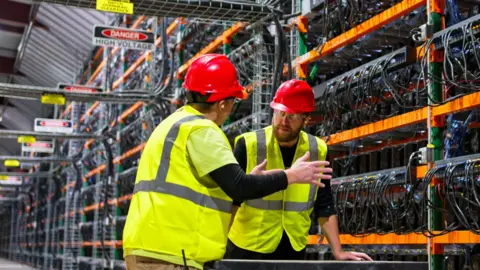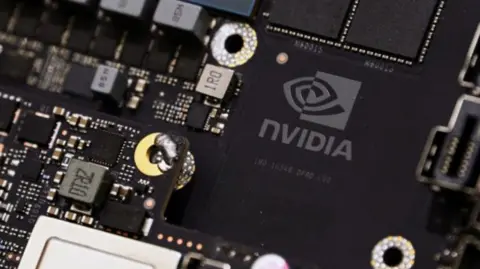Cryptocurrencies and personal AI: Tech to watch out for in 2025
 Getty Images
Getty ImagesNot even AI can predict the future (yet), nevertheless two of our tech editors have taken a look ahead to what they think will be big in 2025.
Crypto’s friend in the White House?
As 2022 drew to a close the outlook was bleak for the cryptocurrency business.
One of its best know firms, FTX, had collapsed with $8bn (£6.3bn) of customer funds unaccounted for.
In March of 2024, the company’s co-founder Sam Bankman-Fried received a 25-year jail sentence for defrauding customers and investors.
The scandal rattled confidence in the whole sector.
It seemed that cryptocurrencies would remain a niche product, with an enthusiastic but relatively limited following.
But just a few months later and the industry was fizzing with optimism again. Behind the enthusiasm – the success of Donald Trump in the 5 November presidential election.
The feeling was that he would be more favourable to the cryptocurrency sector and, so far, that seems to be the case.
In early December, Trump said he would nominate former Securities and Exchange Commission (SEC) commissioner Paul Atkins to take up the top chairman role at the Wall Street regulator.
Mr Atkins is seen as being far more pro-cryptocurrency than outgoing head, Gary Gensler.
That announcement helped the value of one bitcoin, the biggest of the numerous cryptocurrencies, surge through $100,000.
“With Trump winning you can imagine in 2025 you’ll get proactive regulation. You’ll get removal of some negative regulation, which will then allow banks and other institutions into the space,” says Geoffrey Kendrick, global head of digital assets research at Standard Chartered.
In particular, Mr Kendrick points to a piece of guidance issued by the SEC called SAB 121. Since taking effect in 2022 it has made it difficult for banks and other financial firms to provide cryptocurrency services.
Such a move might help Trump to fulfil his promise made in July to make the US the cryptocurrency capital of the world.
If he makes good on that pledge it would be a remarkable turnaround from 2021 when Trump described Bitcoin as a “scam”.
 Getty Images
Getty ImagesAI gets personal
As AI tools move into our phones – Apple, Google and Samsung have all launched services that can edit photos, translate languages and carry out web searches – we are at the start of an era in which AI becomes an intrinsic part of our digital lives and increasingly helpful on a personal level.
That’s if we allow it, because it does require a bit of a leap of faith.
Let’s take diary management as an example. An AI tool efficiently can manage your diary for you, if you allow it to access it. But how far should this go?
In order to be truly useful, does that mean it also needs to know who you would rather avoid meeting, or relationships you want to keep secret, and from whom?
Do you want it to provide you with summaries of counselling sessions, or medical appointments?
It’s deeply personal information, and potentially both hugely embarrassing and extremely valuable if some glitch meant it was shared. Do you trust the big tech firms with that kind of data?
Microsoft is pushing hard at this particular door. It got into trouble in 2024 for demoing a tool called Recall, which took snapshots of laptop desktops every few seconds, in order to help users locate content they’d seen but couldn’t remember where.
It has now made a number of changes to the product – which was never launched – but stands by it.
“I think we’re moving to a fundamentally new age where there will be ever present, persistent, very capable co-pilot companions in your everyday life,” the firm’s head of AI, Mustafa Suleyman told me recently.
Despite the challenges, Ben Wood, chief analyst at technology research company CCS Insight, expects that more personalised AI services will emerge in 2025.
“The output will be continuously updated by drawing on evolving data sources, such as emails, messages, documents and social media interactions.
“This will allow the AI service to be tuned specifically to a person’s communication style, needs and preferences,” he says.
But Mr Wood accepts that letting AI loose on your personal information will be a big step.
“Trust will be essential,” says Mr Wood.
 Getty Images
Getty ImagesData on the move
The more money pours into AI, then the more datacentres will need building.
Training and running AI requires a lot of computing power, and works best with the latest computer chips and servers.
Over the next five years as much as $1tn could be invested in datacentres by the biggest data users, including Google, Microsoft and Meta, according to CCS Insight.
In Europe alone, between 2024 and 2028, data centre capacity is expected to grow by an average of 9% annually, according to property services company Savills.
But those new facilities are unlikely to be built in the current datacentre hubs like London, Frankfurt, and Amsterdam.
High property prices in those cities – Savills says that in London land prices can be as much as £17m per acre – plus tight electricity supply means developers will be looking elsewhere.
In the UK cities like Cambridge, Manchester and Birmingham could well be home to the next wave of datacentre construction.
Elsewhere, Prague, Genoa, Munich, Dusseldorf and Milan are likely to be considered in Europe.
 Getty Images
Getty ImagesAt the heart of some of those new datacentres will be the latest computer chip from Nvidia, the company that dominates the market for chips used for AI.
Unveiled in March 2024, the Blackwell chip is expected to start shipping in significant number in 2025.
The new chip should allow tech firms to train AI four times faster and see AI operate 30 times faster than current computer chips, according to Vivek Arya, senior semiconductors analyst, at Bank of America Securities.
Nvidia’s biggest customers, Microsoft, Amazon, Meta and Coreweave are likely to get the tech first, according to reports.
But other customers might struggle to get their hands on the super chip, with “supply constrained in 2025”, according to Mr Arya.
- Follow BBC Technology Editor Zoe Kleinman on X
- Follow BBC Technology of Business Editor Ben Morris on Bluesky







